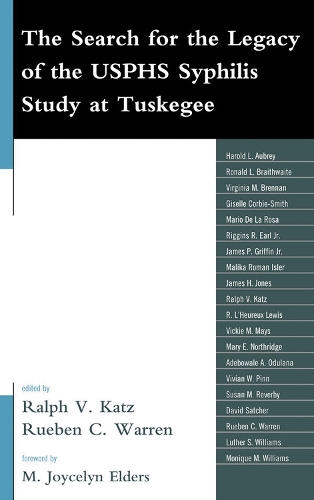
The Search for the Legacy of the USPHS Syphilis Study at Tuskegee: Reflective Essays Based upon Findings from the Tuskegee Legacy Project
(Paperback)
Available Formats
Publishing Details
The Search for the Legacy of the USPHS Syphilis Study at Tuskegee: Reflective Essays Based upon Findings from the Tuskegee Legacy Project
By (Author) Ralph V. Katz
Edited by Rueben Warren
Contributions by M Joycelyn Elders
Contributions by Rueben C. Warren
Contributions by Vivian W. Pinn
Contributions by James H. Jones
Contributions by Susan M. Reverby
Contributions by David Satcher
Contributions by Mary E. Northridge
Contributions by Ronald Braithwaite
Bloomsbury Publishing PLC
Lexington Books
5th April 2013
United States
Classifications
Professional and Scholarly
Non Fiction
Ethics and moral philosophy
Central / national / federal government policies
Social welfare, social policy and social services
364.142
Physical Properties
Paperback
208
Width 152mm, Height 228mm, Spine 15mm
313g
Description
The Search for the Legacy of the USPHS Syphilis Study at Tuskegee is a collection of essays that seeks to redefine the "legacy" of the infamous Tuskegee Syphilis Study in light of recent findings from other scientific studies that challenge the long-standing, widely-held understanding of the study. These essays are written with thoughtful attention to fully integrate the essayists' perspectives on the impact of the study on the lives of Americans today and place the legacy of the study within the evolving picture of racial and ethnic relations in the United States. Each essayist looks through his or her own personal and professional prism to give an account of what constitutes that legacy today. Contributors include the two leading historians of the Tuskeegee Syphilis Study and two former Surgeons General of the United States as well as other prominent scholars from the fields of public health, bioethics, psychology, biostatistics, medicine, dentistry, journalism, medical sociology, medical anthropology, and health disparities research.
Reviews
This collection of essays looks at the historical and bioethical issues stemming from the USPHS Syphilis Study at Tuskegee, especially the legacy generated by the 40-year abuse of African American subjects in the study. In the excellent Examining Tuskegee (CH, May'10, 47-5055), Susan Reverby discussed how the long-held assumptions of the legacy have proven problematic. Here, contributors examine the evidence for two assumptions of the legacy: African Americans are less willing than whites to participate in biomedical research studies, and relative willingness to participate is associated with an awareness of the USPHS study at Tuskegee. The conclusion of the editors is that neither assumption is supported by the evidence of numerous studies of the past decade. That is just the beginning, however; the 14 essays that make up the body of the book deal, often in personal ways, with the variety of legacies that exist in the troubled landscape of racial relations, biomedicine, and the cultural realities of American life. The Tuskegee experience remains relevant and rightfully disturbing in so many ways, even if the assumptions of the original legacy have faded. Summing Up: Recommended. Academic and professional readers, all levels. * Choice Reviews *
The books essays testify to the varied legacies of the USPHS Syphilis Study at Tuskegee, viewed through the authors very personal prisms. In the years since the story broke in 1972 and President Clinton apologized to the survivors of the infamous government-led study in 1997, new legacies have been identified and older ones proven invalid. The essayists, from diverse disciplines and backgrounds, provide unique perspectives on the evolving legacy of the Tuskegee Syphilis Experiment. -- Joan Echtenkamp Klein, Biomedical Librarian, University of Virginia Health System
A commendable collection of facts and opinions... woven into the fabric of explanations to answer the many unsettling questions about the USPHS Syphilis Study in Tuskegee and Macon County, Alabama. It is very important that we continue to seek answers and attempt to bring good from an evil act that was imposed on loving human beings in the name of medical research. -- Lillie Head, daughter of USPHS Syphilis Study participant
Addressing the social implications, public health impact and attitudinal sequellae of the reprehensible US Public Health Service Syphilis Study, this volume is a powerful, insightful, and scholarly assessment of these egregious events. The notable contributors underscore the fact that continued vigilance in support both of fully informed consent and of the need to redress contemporary healthcare disparities are obviated neither by the welcomed presidential apology nor by the establishment of the National Center for Bioethics at Tuskegee University. Continued bioethics research funding and training of scholars and professional practitioners in the field remain vitally necessary. Moreover, the struggle to establish enforceable policies that proactively mitigate and prevent illness and protect the health and healthcare entitlements of ethnic minorities and impoverished communities, not only in the United States but also globally, should and must vigorously continue. Only then can we legitimately be assured that 'never again' will such atrocities occur. -- Gilbert Rochon, President, Tuskegee University
Author Bio
Ralph V. Katz is professor and chair, Department of Epidemiology and Health Promotion at the New York University College of Dentistry.
Rueben C. Warren is professor and director of the National Center for Bioethics in Research and Health Care at Tuskegee University.
